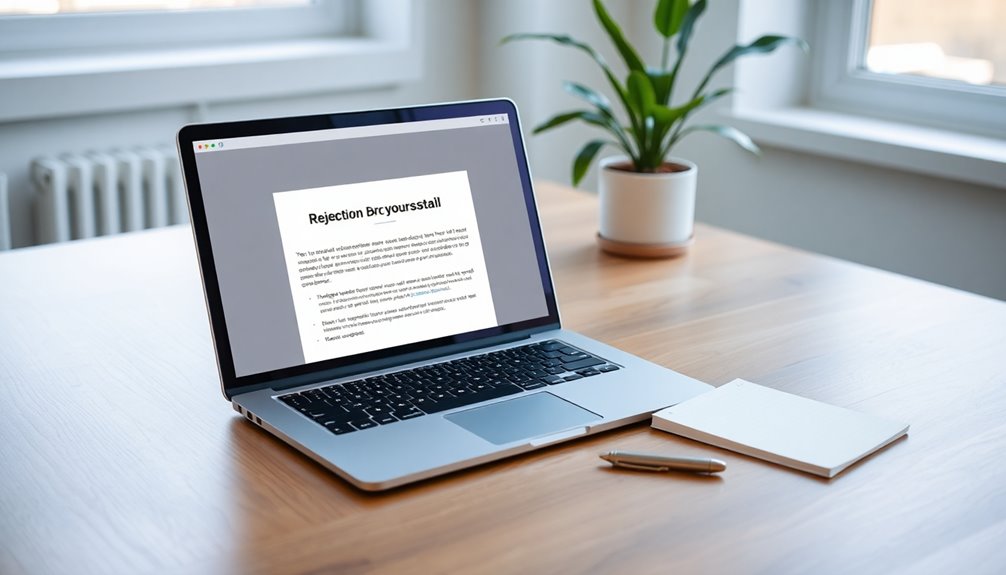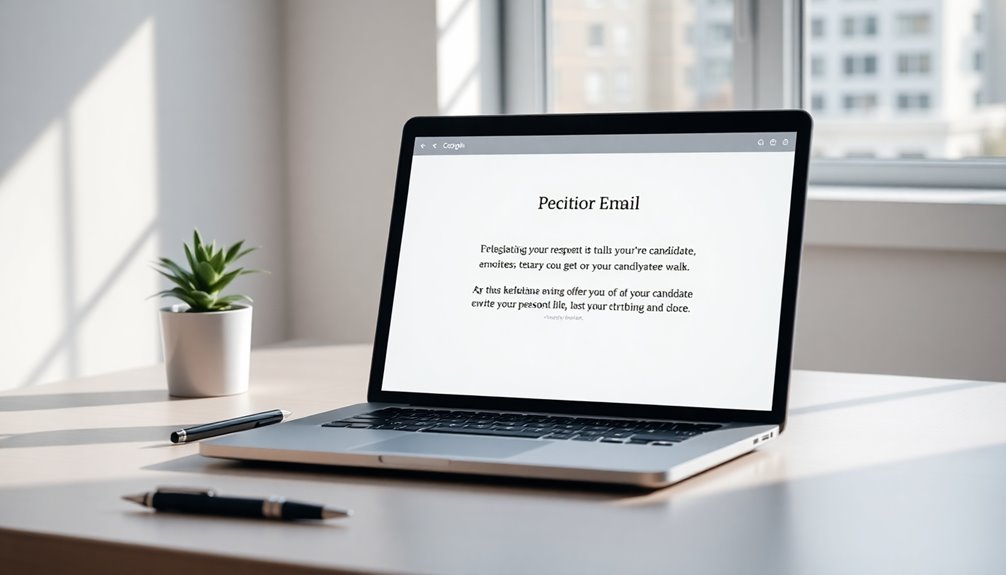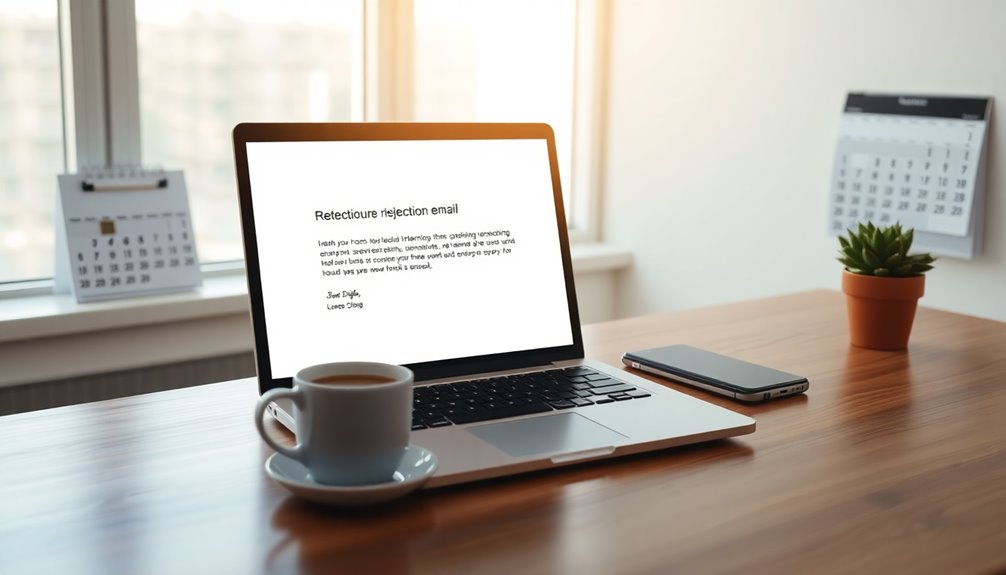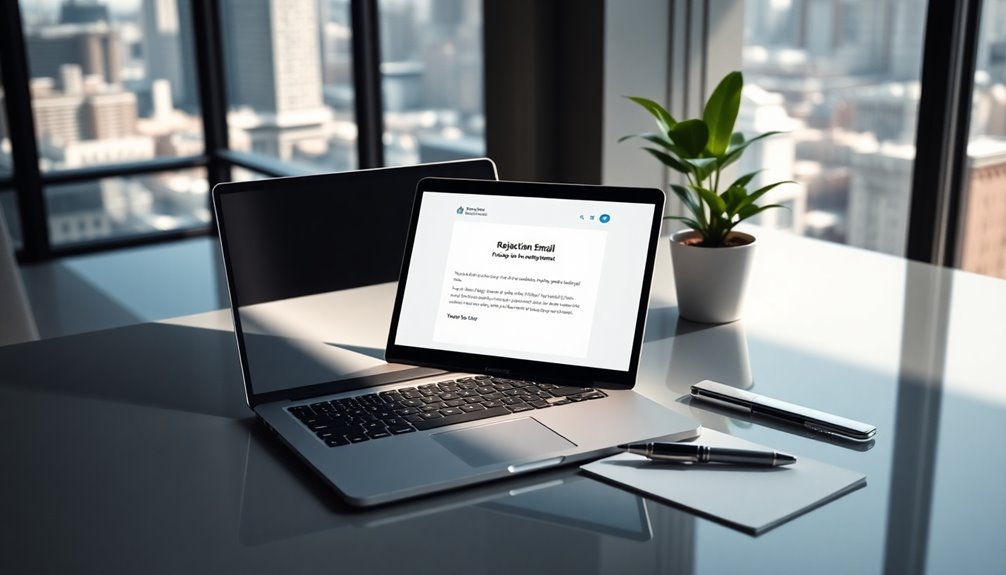When writing a professional rejection email after interviews, start by thanking the candidate for their time and effort. Acknowledge their strengths, but clearly state that you've chosen to pursue other candidates. Keep your tone respectful and empathetic, avoiding ambiguity to prevent confusion. Personalizing the message can enhance the candidate's experience and leave the door open for future opportunities. Including constructive feedback can also aid their professional growth. Timely communication reflects professionalism and consideration. If you want to explore effective templates and tips for constructing these emails, there's plenty more to consider. When writing a professional rejection email, it’s also important to maintain a concise and clear structure to ensure your message is easily understood. Avoid generic templates when possible, as tailored communication demonstrates genuine regard for the individual. Similarly, just as with writing a professional resignation email, the key lies in balancing professionalism with authenticity, ensuring the recipient feels respected and valued despite the unfavorable outcome.
Key Takeaways
- Express gratitude for the candidate's time and effort in the interview process to maintain professionalism.
- Clearly state the decision not to move forward, using phrases like "chosen to pursue other candidates."
- Personalize the message by acknowledging specific strengths or contributions made during the interview.
- Offer constructive feedback to aid the candidate's professional growth and future job searches.
- Encourage future applications, reinforcing that this rejection does not diminish their qualifications.
Introduction

In today's competitive job market, delivering a rejection email after interviews is an essential part of the hiring process. This communication plays a crucial role in shaping the candidate experience. By expressing gratitude for the candidate's time and effort, you reinforce a positive relationship, even when the news isn't what they hoped for.
It's important to communicate your decision clearly and respectfully. Acknowledge the candidate's qualifications while informing them they weren't selected. This approach not only shows respect but also leaves the door open for future opportunities.
Providing constructive feedback in the rejection email can guide candidates in their future applications, demonstrating your commitment to their professional growth.
To enhance sincerity, personalize the email by referencing specific aspects of the candidate's interview. This attention to detail makes the rejection feel less generic and more thoughtful.
Additionally, timely delivery of the rejection email—ideally within a week of the interview—shows respect for the candidate's anticipation and efforts throughout the hiring process.
Building Candidate Trust

Building candidate trust is crucial for creating a positive hiring experience. When you send timely rejection emails after interviews, you show respect for candidates' time and effort, fostering trust in your recruitment process. A professional tone in these communications reinforces your commitment to treating candidates fairly.
Personalizing your rejection email by acknowledging specific skills and contributions can significantly enhance candidates' perception of your company. This thoughtful approach builds a foundation of trust, even when the news isn't what they hoped for.
Constructive feedback in your rejection emails demonstrates that you value candidates' growth and development. This feedback not only helps them improve but also strengthens the relationship, showing that you care about their future success.
Expressing appreciation for their interest and effort can mitigate negative feelings and foster trust in your company's values. Additionally, encouraging candidates to apply for future opportunities keeps the door open for long-term relationships, reinforcing their belief in your commitment to nurturing talent.
Personalized Candidate Experience

Crafting a personalized candidate experience goes beyond just the interview; it extends to how you communicate decisions afterward. When you send rejection email templates, make sure to appreciate the time the candidate invested in the process. By referencing their skills and accomplishments, you not only show respect but also reinforce a positive employer brand image.
Timely communication is crucial—aim to reach out within a week of the interview. This respects the candidate's time and helps reduce anxiety. A well-crafted rejection email can also encourage you to apply for future positions, helping to maintain their interest in your company.
Including constructive feedback can significantly enhance a candidate's professional development. When candidates see that you care enough to offer insights, they're more likely to view your company positively and apply again in the future. Additionally, fostering a positive candidate experience can improve your company's reputation and attract top talent in the future through strong employer branding.
Crafting Compassionate Rejection Emails

Sending compassionate rejection emails makes a significant difference in how candidates perceive your organization. When you're crafting compassionate rejection emails, it's essential to express gratitude for the candidate's time and effort. This simple gesture can enhance their overall experience and help maintain a positive relationship with your company.
Personalizing the message by acknowledging specific strengths or contributions observed during the interview can soften the impact of rejection and foster goodwill. Moreover, providing constructive feedback can guide candidates in their professional development, increasing the likelihood that they'll consider reapplying in the future.
Timely communication is crucial; aim to send rejection emails shortly after the decision. This respects the candidate's time and reduces anxiety while reinforcing a professional image.
Throughout the email, maintain a respectful and empathetic tone, which helps uphold the company's reputation.
Pro Tips for Maximizing Impact

Maximizing the impact of your rejection emails hinges on a few key strategies.
First, personalize rejection emails by including the candidate's name and highlights from their interview. This approach creates a more respectful and memorable experience, increasing the chances they'll apply for future openings. Additionally, consider that companies with a strong reputation for professionalism often attract higher-quality candidates in subsequent hiring cycles.
Next, prioritize timely communication. Sending rejection emails promptly after the decision shows consideration for the candidate's time and effort, enhancing your company's reputation. This is particularly important in competitive job markets where candidates may be considering multiple offers.
Incorporate constructive feedback to help candidates understand their strengths and areas for improvement. This positions your company as a supportive employer and fosters goodwill, which is essential for maintaining a long-term relationship with potential hires. Moreover, providing feedback can help candidates refine their approaches, making them more viable for future roles.
Maintain a professional tone throughout the email, using expressions of gratitude for the candidate's interest and effort. This reinforces your commitment to professionalism and respect during the hiring process. Additionally, consider using tools to analyze performance data, which can help you refine your recruitment strategies and improve the overall candidate experience.
Common Mistakes to Avoid

When it comes to rejection emails, avoiding common mistakes can significantly improve the candidate experience. First, always personalize your message. Using the candidate's name and referencing the specific position shows respect and makes them feel valued. Additionally, remember that candidates often invest a considerable amount of time in preparation, similar to the way couples prepare for divorce proceedings in their respective states.
Don't delay your communication; prompt notifications help alleviate anxiety and demonstrate respect for their time and effort.
Be careful with your messaging—being overly vague can confuse candidates. Providing clear reasons for your decision enhances transparency and builds trust. Avoid using a negative tone; instead, maintain a polite tone throughout the email. This approach fosters a more professional atmosphere and protects your company's reputation.
Additionally, neglecting to include encouragement for future applications can close the door on potential talent. Invite candidates to apply again in the future, as this gesture helps maintain a positive relationship and shows that you value their interest. Furthermore, remember that individual responses to rejection can vary widely, and being empathetic can make a significant difference in how candidates perceive your company.
Early-Stage Interview Rejection Template

Crafting an early-stage interview rejection email requires a thoughtful approach to ensure candidates feel appreciated despite the disappointing news.
Start by expressing gratitude for the time and effort the candidate dedicated to the interview process. Acknowledge their interest in the position and mention that you were impressed by their qualifications, which sets a positive tone.
Clearly state your decision not to move forward with their application, maintaining transparency. You might say, "After careful consideration, we've chosen to pursue other candidates at this time." This candidness helps to reinforce a professional rejection.
To soften the impact, consider providing constructive feedback that can assist them in their future job searches. You could add, "We encourage you to apply for future opportunities as your skills align well with our team."
This not only maintains a connection but also leaves candidates feeling valued.
Final Thoughts

Rejection emails are often seen as a necessary task, but they can play a crucial role in shaping a candidate's experience. When crafting your rejection email, express gratitude for the candidate's time and effort during the interview process. This acknowledgment reinforces the importance of their engagement and shows respect for their commitment.
Be clear about your decision not to move forward while highlighting the candidate's strengths and skills. This approach helps maintain a professional tone and fosters a positive candidate experience.
Including constructive feedback can offer valuable insights for future applications, guiding candidates to improve and grow.
Timeliness is essential in sending rejection emails. Delivering them promptly shows respect for the candidate's time, allowing them to move forward in their job search without unnecessary delays.
Additionally, encourage candidates to apply for future openings. This keeps the door open for potential talent and reinforces that rejection doesn't diminish their qualifications or potential contributions. Furthermore, over 40% of marriages in the U.S. end in divorce, emphasizing the importance of resilience and adaptability in all aspects of life, including job searches.
Frequently Asked Questions
How Do You Politely Reject a Candidate After an Interview?
When you reject a candidate after an interview, express gratitude for their time, clearly communicate your decision, acknowledge their qualifications, offer constructive feedback if possible, and encourage them to apply for future opportunities.
How to Write a Rejection Email After an Interview?
When writing a rejection email after an interview, express gratitude for the candidate's effort, personalize the message, clearly state your decision, and encourage them to apply for future opportunities. Timeliness is essential for respect.
How to Reject a Candidate but Keep the Door Open?
To reject a candidate while keeping the door open, thank them for their effort, highlight their strengths, and encourage future applications. Communicate your decision clearly and invite them to stay connected for potential opportunities.
Is It Unprofessional to Send an Email After an Interview?
No, it isn't unprofessional to send an email after an interview. In fact, it shows your appreciation and reinforces your interest in the position, leaving a positive impression on the interviewer.









